A GP failure to act on information claim seeks compensation for when your GP does not treat your medical condition according to the available facts. It may be GP medical negligence if they do not act on information that affects your health, and you can claim compensation.
Your GP should act on all available information and has a duty of care to refer you for further testing, make changes in medication as instructed by a hospital consultant and to follow up on test results.
The GP has a duty of care to patients; if they breach that duty of care, it could be medical negligence. You may have a compensation claim for the effects of the GP negligence on your health today and in the future.
Medical negligence is when you receive medical care below a level that any other medical professional would not provide.
A medical professional, like your GP, has a duty of care to their patients. When they breach that duty of care and cause you unnecessary suffering, you may have a GP negligence claim for compensation.
The Medical Negligence Team solicitors can take your claim and seek compensation in a GP failure to act claim.
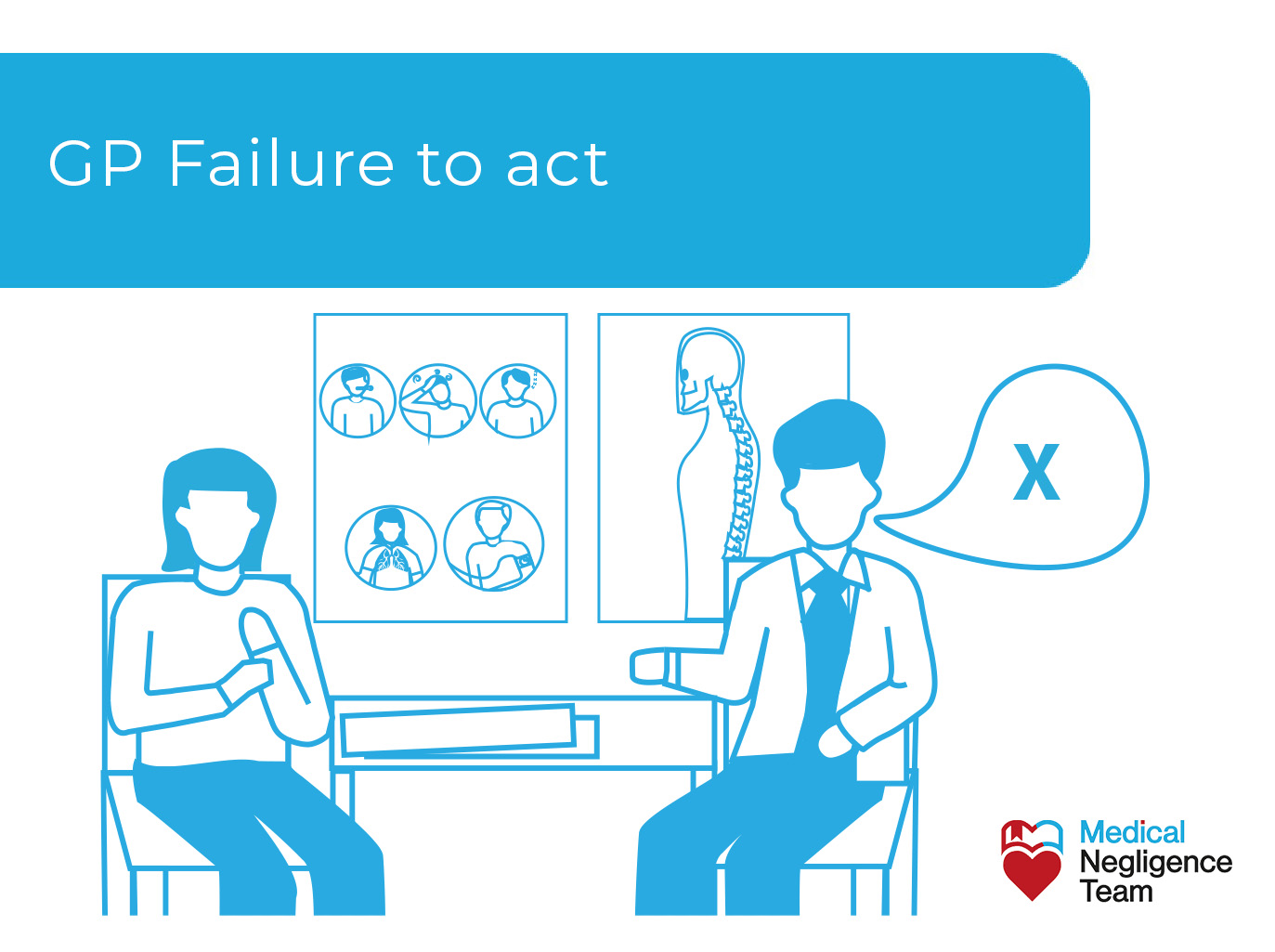
Table of Content
What is a GP failure to act claim?
A GP failure to act claim to act is a compensation claim for when a GP fails to treat you according to all the available information they have for your medical condition.
The GP failure to act claim may be for when the GP does not follow up on your blood tests and X-rays from the hospital or when a hospital consultant recommends a change to your medication but the GP fails to implement it or issues a prescription for incorrect medication instead.
You make a claim for compensation for the GP’s breach of duty of care to you or a loved one. Medical negligence is when a medical professional provides you with treatment no other medical professional would provide in similar circumstances.
If you suffer when your GP fails to act on information, you may have a medical negligence compensation claim.
A No Win No Fee medical negligence solicitor can make your claim for the damages due to the breach of duty of care by the GP in a medical negligence compensation claim.
Common negligence claims for a GP failure to act
Common negligence claims for a GP failure to act range from not following up on test results to not changing medication as recommended by a consultant.
A GP has a duty of care to their patients. Not acting on information may be a breach of their duty of care to you, and you may have a medical negligence compensation claim.
Common medical negligence claims for a GP failure to act are:
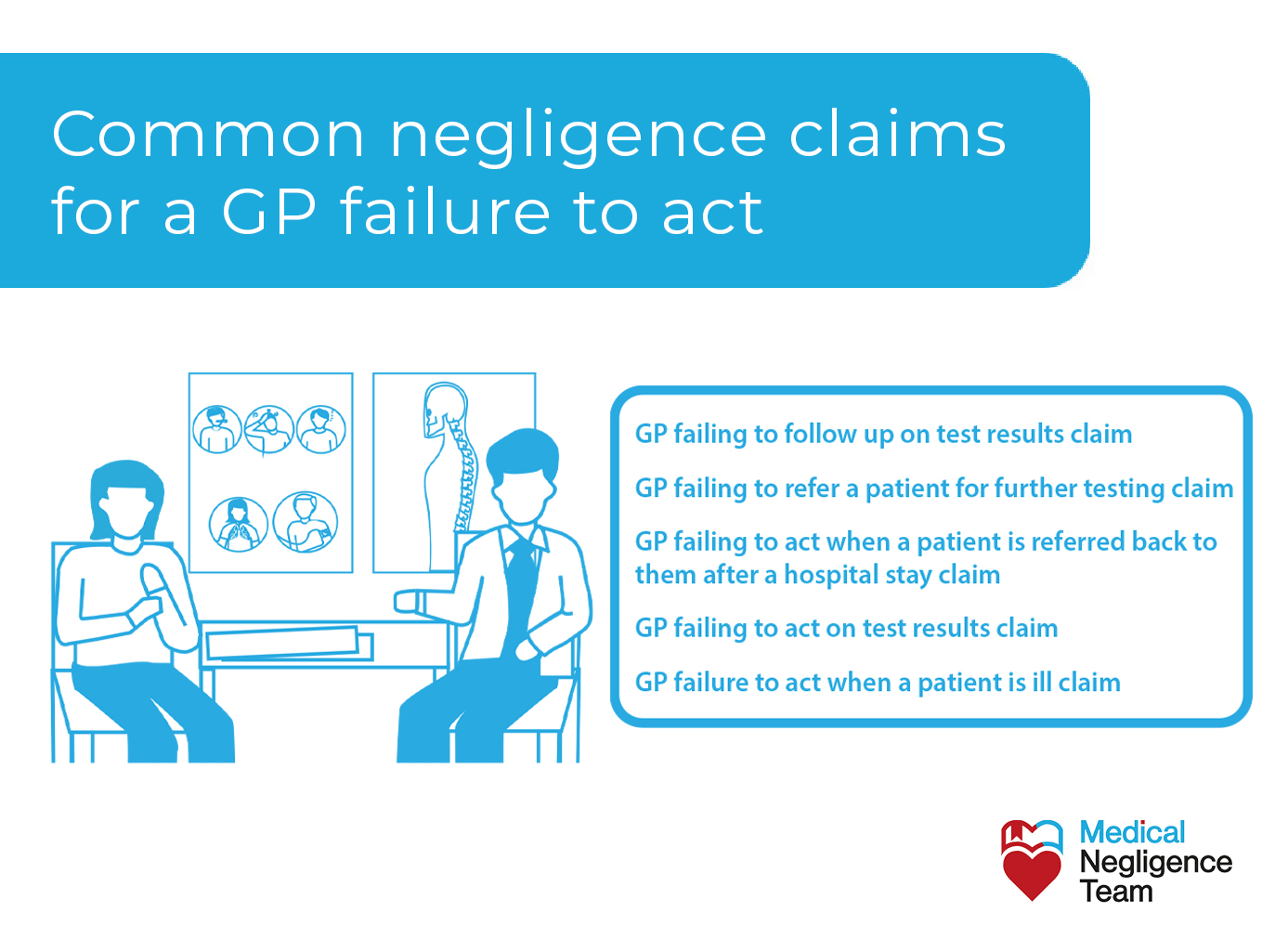
GP failing to follow up on test results
A GP failing to follow up on test results happens when they do not contact the hospital or access your records after you have had tests at the hospital or private clinic.
Following up on test results is a vital part of your treatment or proposed treatment path, and every GP should ensure they are up to date with your health records.
A GP should follow up on test results such as:
Failing to follow up on test results may be part of a GP failure to act claim, and your No Win No Fee solicitor can handle your case for you.
GP failing to refer a patient for further testing
A GP failing to refer a patient for further testing can delay the diagnosis of a condition, cause stress and anguish to a patient and may waste valuable time in beginning a course of treatment.
If you are ill or showing signs of a condition, the GP should refer you for further testing. Failure to act may be a case of GP medical negligence.
A GP should refer a patient for further testing, such as:
You may have a GP negligence claim for compensation if the GP fails to act by referring you for further testing.
GP failing to act when a patient is referred back to them after a hospital stay
A GP failing to act when a patient is referred back to them after a hospital stay may delay treatment and affect their recovery.
After being in hospital, your GP must act on instructions from the hospital consultant and keep you on the road to recovery.
The GP should act on recommendations from the hospital consultant, such as:
When your GP fails to act on instructions from the hospital and your health suffers, you may have a medical negligence claim for compensation.
GP failing to act on test results
The GP failing to act on test results may worsen your condition, delay the beginning of treatment or even put your life in danger in some cases.
You trust your GP, and when they breach their duty of care to you by failing to act on test results, your health could suffer and reduce your chances of recovery.
The GP should act on test results:
A GP’s failure to act on test results is a serious breach of their duty of care to a patient, and you could have a medical negligence claim for compensation.
GP failure to act when a patient is ill
A GP failure to act when a patient is ill can lead to the patient getting worse or, in some cases, very quickly lead to a medical emergency with all that entails.
The GP should act quickly when a patient is ill. They should refer them for immediate hospital treatment or prescribe suitable medication.
A failure to act by the GP when a patient is ill can:
Your GP is your first port of call when you are ill. If the GP fails to act on your illness, it could cause you to get a lot worse very quickly.
Any failure to act by a GP is a breach of their duty of care to you. A No Win No Fee solicitor can look at your case and see if you have a valid compensation for a GP failure to act claim.
Compensation for a GP failure to act claim
You can seek compensation for a GP failure to act claim in amounts from the low £10,000s to over £10 million in some cases.
The compensation awarded when your GP fails to act when you need further treatment varies depending on several factors, such as how much discomfort and disruption you experience in your life today and in the future.
Claims sometimes see very high awards, such as when a patient becomes very ill due to delays in beginning treatment or suffers unnecessary pain and anxiety due to a missed diagnosis of cancer.
Compensation for when a GP fails to act can see awards of:
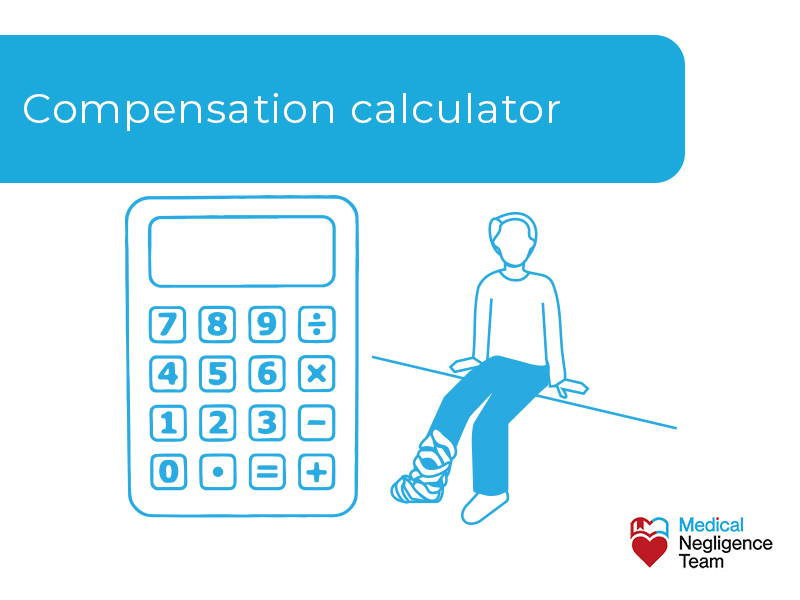
All amounts are approximate and are only a guide to what is possible in a GP failure to act claim. Figures can be high in some claims as you or a loved one could need long-term care and may face medical bills for life. You may be able to claim for these care expenses and the medical costs in the future with a GP failure to act compensation case.
As in all medical negligence claims, each case is dealt with on merit and how much the patient suffers due to the medical negligence of the GP’s failure to act.
A No Win No Fee medical negligence solicitor will be the one to advise you on a GP failure to act claim. They will know from experience what your case may be worth and how to make a successful claim for compensation.
Our Process
Our team members have a higher career win rate with a 75% success rate on NHS letters of claim, compared to an industry average of 54.5%.
Enquiry
The first step is to get in touch and tell us what went wrong. It’s free and easy. Call our 24-hour helpline: 0800 246 1122 or request a callback here.
Medical Evaluation
Once you have spoken with our team we’ll let you know how we can help. Typically the next step is to obtain your medical records for us to review.
Legal Letter
Once all your medical records have been received they will be reviewed by a medically & legally qualified member of our team. If there is evidence of medical negligence we will send a letter of claim to the negligent party outlining your medical negligence claim.
Who is eligible for compensation in a GP failure to act claim?
The patient who suffers from their condition getting worse due to a GP failure to act may be eligible to claim for compensation. The medical negligence has made them ill, and if the GP had referred them further, they may have made a recovery.
The patient can claim compensation for the effects on their life of the GP failure to act negligence. They suffer the pain, illness, constant nausea and other symptoms due to a cancer misdiagnosis or a missed diagnosis of diabetes. The clear medical negligence could lead to complications for life and years of unnecessary suffering.
GP medical negligence may lead to psychological trauma, a condition worsening and delays in beginning treatment.
Medical negligence often has very severe consequences, and if a patient passes away due to medical negligence, the ones left behind may have a claim for compensation.
Loved ones in a medical negligence case are known as ‘dependents’ and can be:
When you have a GP failure to act claim, your No Win No Fee medical negligence solicitor can help make the case for compensation.
What can you sue for in a GP failure to act claim?
You can claim compensation for any damages that occurred when you sue in a GP failure to act claim.
There are two types of compensation damages due when suing for any type of medical negligence, such as the GP failure to act when you are ill:

Potential risks of a doctor failing to act on information
The potential risks of a doctor failing to act on information can be your condition getting worse, delays in your treatment, and you being on the wrong medication.
A GP should act on information when they have it, and failing to act on information could be medical negligence.
Common potential risks of a doctor failing to act on information are:
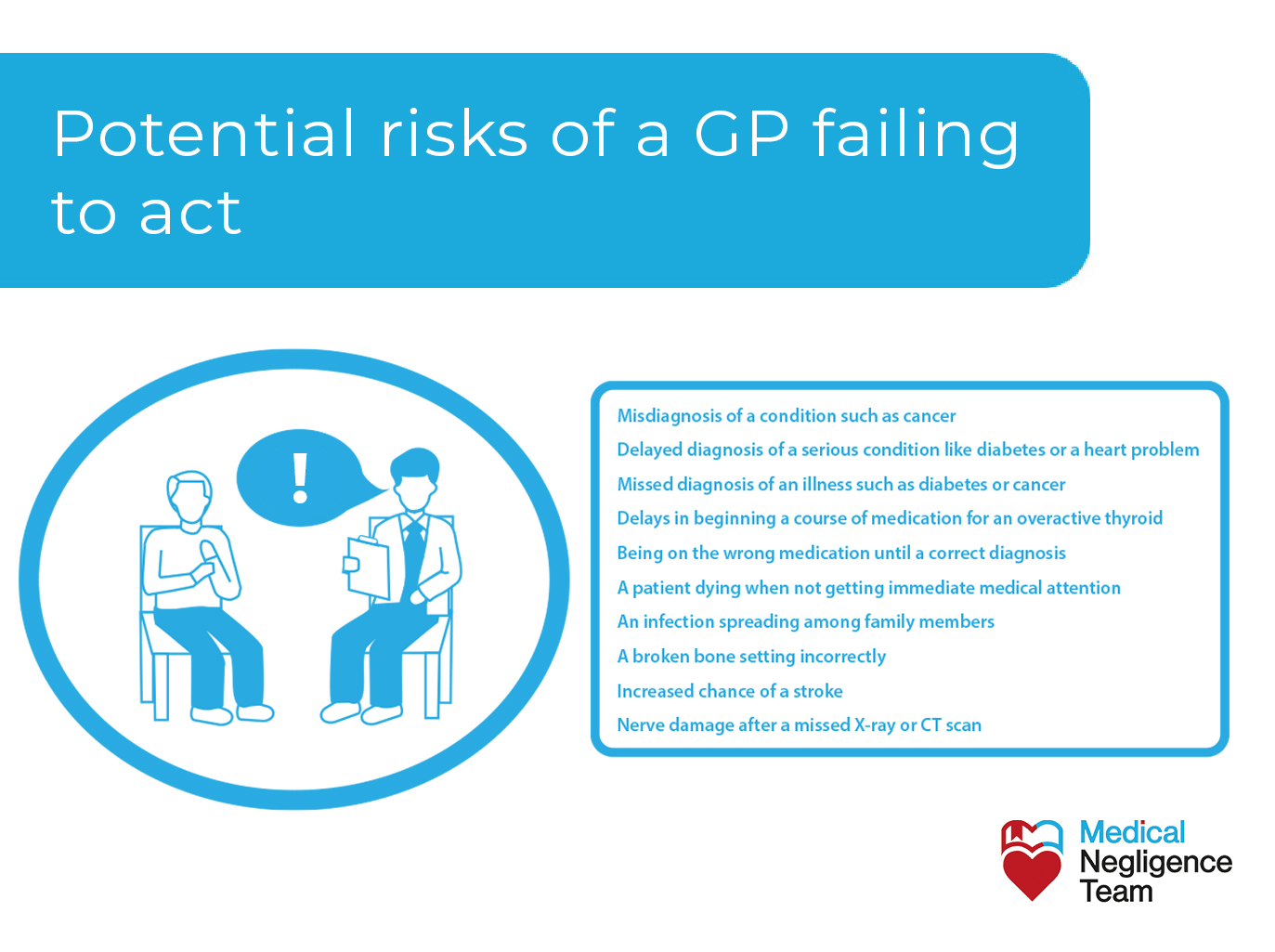
A patient could suffer for months and even years due to a GP’s failure to act on information. A missed diagnosis of diabetes or a failure to refer a patient for further cardiac investigation can cost valuable time and could make some effects permanent for the patient.
A No Win No Fee medical negligence solicitor can look at your claim and see what were the avoidable risks you were exposed to due to a doctor failing to act on information.
Who can be responsible for a failure to act claim?
Any NHS medical professional can be responsible for your failure to act claim. If you suffer due to another medical professional’s failure to act, you may have a claim for medical negligence.
It is not only a GP who is responsible for a failure to act when you may need further medical treatment or medical investigation, such as an X-ray or cancer testing. Trained medical professionals have a duty of care to you when you are ill; a breach of that duty of care, such as a failure to act, may be medical negligence.
The medical professional who can be responsible for a failure to act claim may be:
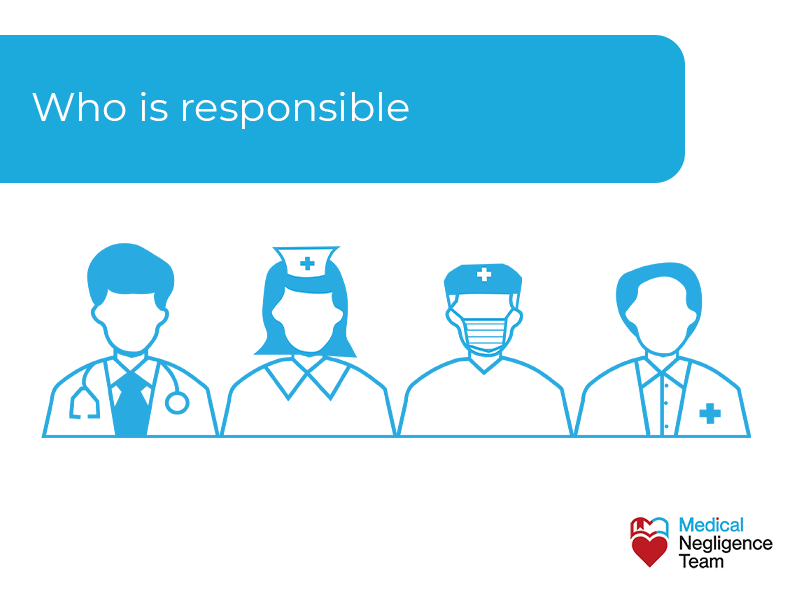
You could suffer a heart attack when the cardiologist fails to act on the results of your ECG. A cancer could spread when the oncologist fails to act on an MRI, which shows a possible tumour, and you may suffer a lifetime of pain and disability when a paramedic fails to act at the scene of an emergency.
If you suffer the medical negligence of a failure to act, you may make a claim against the NHS Trust or hospital that employed the medical professional responsible.
Every medical professional owes you a duty of care when you are a hospital or GP clinic patient. You may suffer medical negligence when they breach that duty of care and do not provide you with a professional service.
Medical negligence is treatment below an acceptable standard by a medical professional. Instead of putting the care needed into your treatment, the doctor, surgeon, GP, or paramedic failed to act on information which is clear medical negligence.
The medical professional could be responsible for a failure to act, causing you unnecessary suffering, and the financial and emotional effects could be with you for life.
You can claim compensation for the failure to act and get help in getting your life and that of any dependents back on track.
GP Negligence
GP negligence is treatment below an acceptable standard by your doctor. Your GP owes you a duty of care as their patient, and when they breach that duty of care to you, you could suffer GP negligence.
GP negligence is a form of medical negligence. It is medical treatment by your GP below a level no other GP would provide in similar circumstances. If your health suffers, you may have a medical negligence claim for the effects of the GP negligence today and in the future.
GP negligence can be:
Any GP negligence could make your condition worse and could put your life at risk. A GP medical negligence claim can help get you the compensation you deserve for the suffering today and in the future.
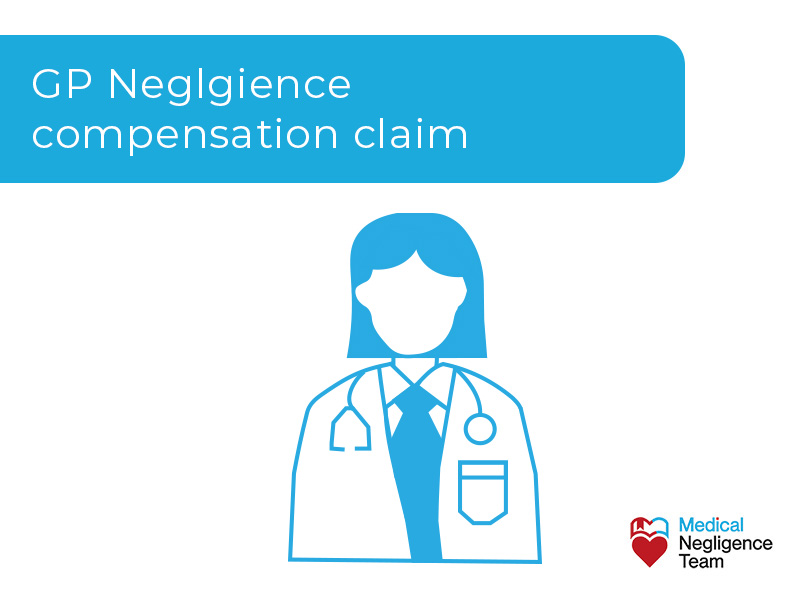
How to make a claim for GP negligence
The steps involved in making a claim for GP negligence go from seeking medical advice to issuing court proceedings when you suffer the effects of a missed diagnosis or the GP fails to refer you for further testing.
The steps are a part of any successful compensation case, and settlement can happen at any stage in the process.
Your medical negligence solicitor will do the rest when you follow the steps correctly and gather all the facts and figures.
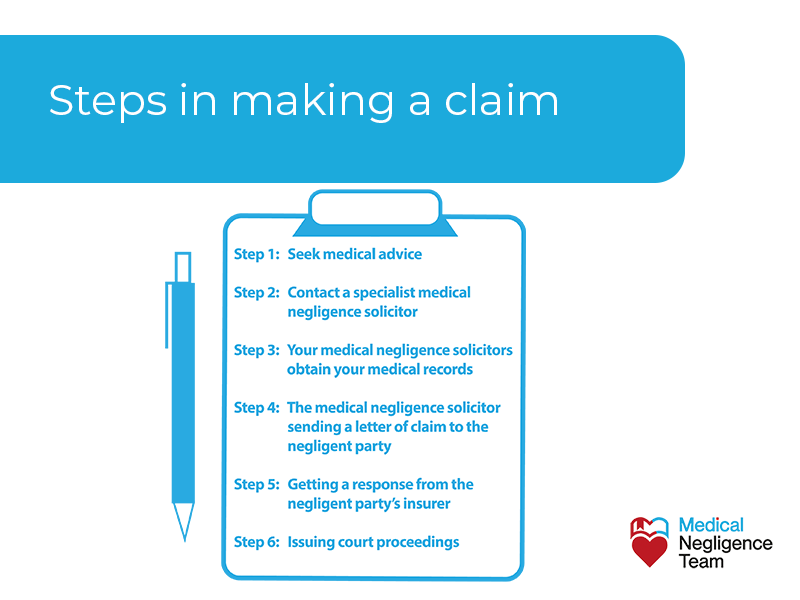
Our Process
Our team members have a higher career win rate with a 75% success rate on NHS letters of claim, compared to an industry average of 54.5%.
Enquiry
The first step is to get in touch and tell us what went wrong. It’s free and easy. Call our 24-hour helpline: 0800 246 1122 or request a callback here.
Medical Evaluation
Once you have spoken with our team we’ll let you know how we can help. Typically the next step is to obtain your medical records for us to review.
Legal Letter
Once all your medical records have been received they will be reviewed by a medically & legally qualified member of our team. If there is evidence of medical negligence we will send a letter of claim to the negligent party outlining your medical negligence claim.
Will I have to go to court with a GP negligence claim?
No, you are very unlikely to have to go to court with a GP negligence claim.
The majority of cases are settled well before there is a need for court action, and NHS Resolution will see most cases are dealt with, in conjunction with your solicitor, before a referral to court by either side.
Medical negligence by a GP can cause you and your family a lot of distress. Your solicitor will want to keep the medical negligence claim out of court and get it settled in your favour as quickly as possible.
If your claim is one of the very few cases that do go to court, it will be handled by your No Win No Fee medical negligence solicitor.
How long do I have to make a claim for medical negligence?
You have three years to make a claim for medical negligence. All medical negligence claims are subject to limitation periods.
For example, in England and Wales, GP medical negligence cases must generally be brought and court proceedings issued within three years of the injury or three years of knowledge of the facts giving rise to the claim.
If someone has passed away, it is the date of death if the limitation period has not expired by that time.
Children not under a disability typically have until they reach 21 to start a medical negligence claim or court proceedings.
Persons with a disability, who lack capacity, are not subject to any limitation period.
Using a No Win No Fee medical negligence solicitor
Using a No Win No Fee medical negligence solicitor is the only way to a successful compensation claim for GP negligence. Your No Win No Fee medical negligence solicitor will not charge you for a claim you do not win.
The medical negligence solicitor will have experience dealing with the NHS and insurance companies when handling a GP failure to act claim. They will know how to handle your compensation claim when you suffer GP negligence and how to make it a successful claim for compensation.
Always have a fee agreement in place before engaging a medical negligence solicitor. If they start talking of a ‘win fee’ or a ‘success fee,’ you should walk away. The negligent party insurers should pay all fees.
The medical negligence solicitor should also operate a 100% Compensation Guarantee scheme. When you win the case, all the money awarded should go to you, not the solicitor.
You are the one who experienced the GP negligence, and you deserve the compensation to get your life back to normal.
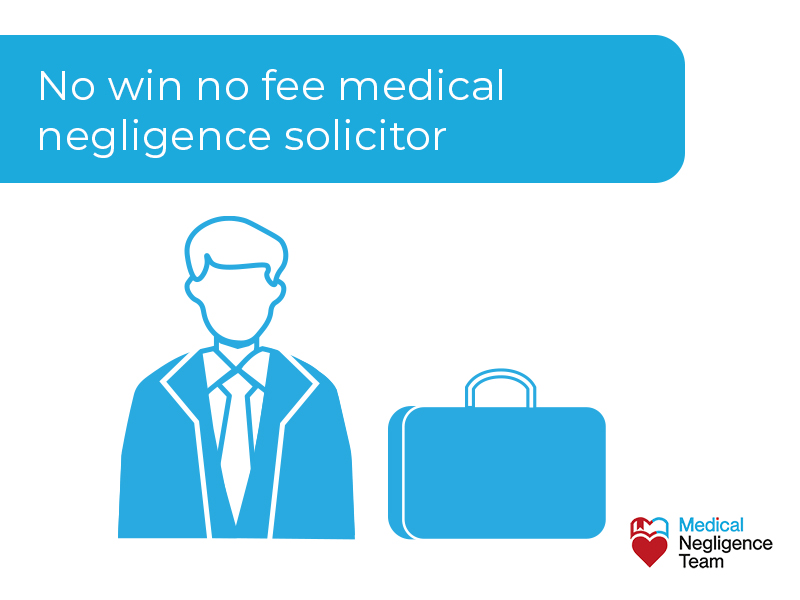
Can I make a claim for GP negligence against the NHS?
Yes, you can make a claim for GP negligence against the NHS. Suing the NHS for negligence is not unusual, and patients may claim compensation from the NHS and receive the money they deserve for the lack of duty of care by a GP.
We trust in and use the NHS daily and do not expect negligence. It happens, though, and with a ‘Never Event’ such as a cancer misdiagnosis or missed diagnosis of stroke by a GP, the patient can claim compensation.
Most people in the UK receive their medical treatment in an NHS hospital or NHS GP surgery. The standard of medical care and service in the NHS is usually excellent, but mistakes happen, and you could have a claim for GP negligence if they fail to act on information and you suffer the effects of their negligence.
The NHS has a dedicated team to handle medical negligence compensation claims called NHS Resolution. NHS Resolution is responsible for treating patients who seek compensation fairly, and they process GP negligence claims every day.
Your No Win No Fee medical negligence team solicitor can handle your claim for GP negligence compensation with NHS Resolution and achieve a successful outcome.
Contact The Medical Negligence Team
Contact the Medical Negligence Team today to discuss your claim for GP negligence. You suffered from a missed cancer diagnosis or a delayed diagnosis of diabetes due to a GP’s failure to act, and you may be able to claim for compensation.
At the Medical Negligence Team, we fight every compensation claim on a No Win No Fee basis and you will not be out of pocket for an unsuccessful claim. We have both the legal and medical experts to guide you along the steps to a successful claim for compensation.
We have a very high success rate and a reputation for a speedy and successful resolution to any GP negligence claims.
Our 100% Compensation Guarantee puts all the money you win into your pocket. You may have a compensation claim if you experience medical negligence due to a GP’s failure to act.
Contact us at the Medical Negligence Team, and let us handle your claim for GP negligence compensation.

